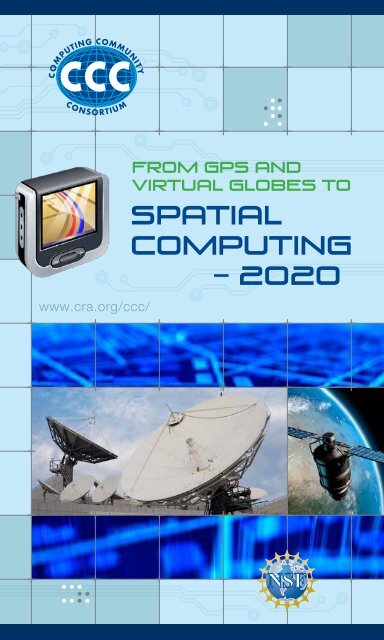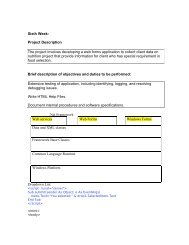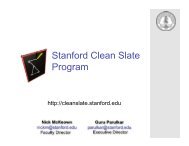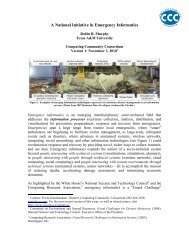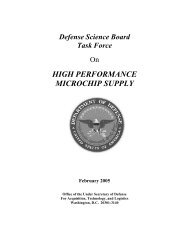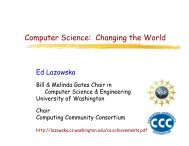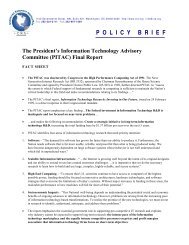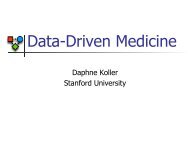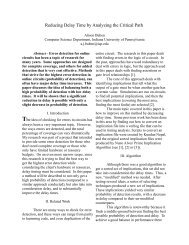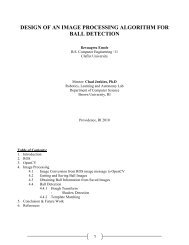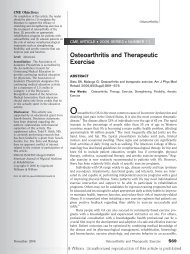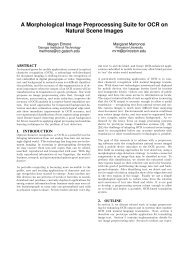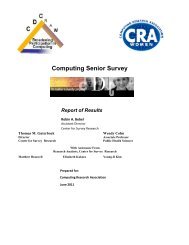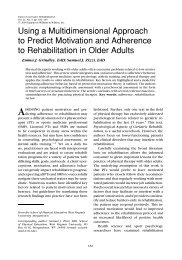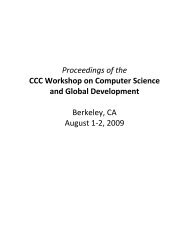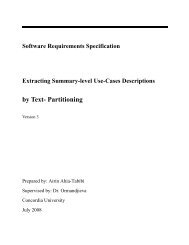Spatial Computing – 2020 - Computing Research Association
Spatial Computing – 2020 - Computing Research Association
Spatial Computing – 2020 - Computing Research Association
You also want an ePaper? Increase the reach of your titles
YUMPU automatically turns print PDFs into web optimized ePapers that Google loves.
www.cra.org/ccc/<br />
From GPS and<br />
Virtual Globes to<br />
<strong>Spatial</strong><br />
<strong>Computing</strong><br />
<strong>–</strong> <strong>2020</strong>
2<br />
www.cra.org/ccc/<br />
From GPS and Virtual Globes to<br />
<strong>Spatial</strong> <strong>Computing</strong> <strong>–</strong> <strong>2020</strong><br />
Workshop Summary<br />
<strong>Spatial</strong> <strong>Computing</strong> is a set of ideas and technologies that will<br />
transform our lives by understanding the physical world, knowing and<br />
communicating our relation to places in that world, and navigating<br />
through those places.<br />
The transformational potential of <strong>Spatial</strong> <strong>Computing</strong> is already evident. From<br />
Virtual Globes such as Google Maps and Microsoft Bing Maps to consumer<br />
GPS devices, our society has benefited immensely from spatial technology.<br />
We’ve reached the point where a hiker in Yellowstone, a schoolgirl in DC,<br />
a biker in Minneapolis, and a taxi driver in Manhattan know precisely where<br />
they are, nearby points of interest, and how to reach their destinations.<br />
Large organizations already use <strong>Spatial</strong> <strong>Computing</strong> for site-selection, asset<br />
tracking, facility management, navigation and logistics. Scientists use GPS<br />
to track endangered species to better understand behavior and farmers use<br />
GPS for precision agriculture to increase crop yields while reducing costs.<br />
Google Earth is being used in classrooms to teach children about their<br />
neighborhoods and the world in a fun and interactive way. Augmented reality<br />
applications are providing real-time place-labeling in the physical world and<br />
providing people detailed information about major landmarks nearby.<br />
This workshop outlines an effort to develop and promote a unified agenda<br />
for <strong>Spatial</strong> <strong>Computing</strong> research and development across US agencies,<br />
industries, and universities. See the original workshop proposal here.<br />
The workshop will identify (1) fundamental research questions for individual<br />
computing disciplines and (2) cross-cutting research questions requiring<br />
novel, multi-disciplinary solutions. The workshop will include US leaders in<br />
academia and the public sector. Results of this workshop will be presented<br />
to the NSF in order to inform possible funding initiatives<br />
The workshop will include presentations from invited thought-leaders and<br />
agency representatives, brainstorming, and interactive demos and focus<br />
group sessions with spatial computing professionals.
Workshop agenda<br />
Day 1<br />
8:30 AM <strong>–</strong> 9:00 AM Opening Remarks, Current Initiatives.<br />
Short overview of the workshop, including goals, agenda,<br />
facilities and logistics, etc., from Workshop Chair Shashi<br />
Shekhar, University of Minnesota<br />
Welcome from Farnam Jahanian, NSF/CISE Assist. Director<br />
Welcome from Erwin Gianchandani, CCC Director<br />
9:00 AM <strong>–</strong> 11:00 AM Push Panel: <strong>Spatial</strong> <strong>Computing</strong> (SC) Platform<br />
Trends, Disruptive Technologies.<br />
Chair: Dinesh Manocha, UNC<br />
Members:<br />
Graphics & Vision: John Keyser, TAMU<br />
Interaction Devices: Steven Feiner, Columbia U<br />
LiDAR : Avideh Zakhor, UCB<br />
GPS Modernization: Mark Abrams, DOD/NRO<br />
Cell Phones: Ramon Caceres, AT&T<br />
Indoor Localization: Greg Welch, UNC<br />
Internet Localization: Rajesh Gupta, UCSD<br />
Cloud <strong>Computing</strong>: Divyakant Agarwal, UCSB<br />
11:00 AM <strong>–</strong> 11:30 AM Break<br />
11:30 AM <strong>–</strong> 12:30 PM Breakout Discussions on new SC research<br />
opportunities from platform trends.<br />
Breakout groups are GISciences, GISystems,<br />
GIServices and Cross-Cutting Areas.<br />
12:30 PM <strong>–</strong> 1:30 PM Lunch (Prepare breakout reports)<br />
1:30 PM <strong>–</strong> 2:00 PM Breakout Report Back.<br />
2:00 PM <strong>–</strong> 3:30 PM Pull Panel: National priorities, Societal Applications<br />
of <strong>Spatial</strong> <strong>Computing</strong>.<br />
Chair: Henry Kelly, OSTP<br />
Members:<br />
DOD: Eric Vessey<br />
DOD: Todd Johanesen<br />
NIH/NIEHS: Michelle Heacock<br />
NASA: John Schnase<br />
DHS: Nabil Adam<br />
NSF EarthCube: Clifford Jacobs<br />
www.cra.org/ccc/<br />
3
4<br />
Workshop agenda continued<br />
3:30 PM <strong>–</strong> 4:00 PM Break<br />
4:00 PM <strong>–</strong> 4:30 PM Identify cross-cutting SC application characteristics.<br />
M. F. Goodchild (UCSB) & V. Kumar (UMN)<br />
4:30 PM <strong>–</strong> 5:30 PM Breakout Discussions on new SC research<br />
opportunities from application trends.<br />
Breakout groups are GISciences, GISystems,<br />
GIServices and Cross-Cutting Areas.<br />
5:30 PM <strong>–</strong> 6:00 PM Breakout Report Back.<br />
6:00 PM <strong>–</strong> 6:15 PM Report Outline, Plan for Day 2.<br />
6:15 PM <strong>–</strong> 8:00 PM Dinner, Keck Center Atrium<br />
Day 2<br />
8:30 AM <strong>–</strong> 9:00 AM Recap Day 1, Announcements.<br />
9:00 AM <strong>–</strong> 10:30 AM Synthesis Presentations on <strong>Spatial</strong> <strong>Computing</strong><br />
(SC) research challenges in SCSciences,<br />
SCSystems, SCServices and Cross-Cutting<br />
Areas.<br />
10:30 AM <strong>–</strong> 11:00 AM Break<br />
11:00 AM <strong>–</strong> 12:00 PM Breakout Discussion to Refine Synthesis Slides.<br />
Breakout groups are SCSciences, SCSystems,<br />
SCServices, and Cross-Cutting Areas.<br />
12:00 PM <strong>–</strong> 1:30 PM Lunch & Presentation of Revised Draft.<br />
1:30 PM <strong>–</strong> 2:00 PM Wrap Up, Post-workshop writing assignments.<br />
www.cra.org/ccc/
Workshop participants<br />
Mark Abrams NRO mcabrams@comcast.net<br />
Nabil Adam Rutgers University nabil.adam@hq.dhs.gov<br />
Peggy Agouris George Mason University pagouris@gmu.edu<br />
Divyakant Agrawal<br />
University of California, Santa<br />
Barbara<br />
agrawal@cs.ucsb.edu<br />
Mohamed Ali Microsoft mali@microsoft.com<br />
Lee Allison Arizona Geological Survey lee.allison@azgs.az.gov<br />
Cecilia Aragon University of Washington aragon@uw.edu<br />
Walid Aref Purdue University aref@cs.purdue.edu<br />
Vijay Atluri Rutgers University atluri@andromeda.rutgers.edu<br />
David Balshaw National Institutes of Health balshaw@niehs.nih.gov<br />
Budhendra Bhaduri Oak Ridge National Laboratory bhaduribl@ornl.gov<br />
Ramon Caceres AT&T <strong>Research</strong> ramon@research.att.com<br />
Kelly Crews National Science Foundation kcrews@nsf.gov<br />
Jade DePalacios NRO jadeap@gmail.com<br />
Beth Driver NGA beth.H.Driver@nga.mil<br />
Jon Eisenberg NAS/CSTB jeisenbe@nas.edu<br />
Tom Erickson IBM snowfall@acm.org<br />
Michael Evans University of Minnesota mevans@cs.umn.edu<br />
Steven Feiner Columbia University feiner@cs.columbia.edu<br />
Jie Gao Stony Brook University jgao@cs.stonybrook.edu<br />
Erwin Gianchandani <strong>Computing</strong> Community Consortium erwin@cra.org<br />
Michael Goodchild University of California Santa Barbara good@geog.ucsb.edu<br />
Sara Graves University of Alabama, Huntsville sgraves@cs.uah.edu<br />
Rajesh Gupta University of California, San Diego rgupta@ucsd.edu<br />
Myron Gutmann National Science Foundation mgutmann@nsf.gov<br />
Susanne Hambrusch National Science Foundation shambrus@nsf.gov<br />
Chuck Hansen University of Utah hansen@cs.utah.edu<br />
Michelle Heacock National Institutes of Health heacockm@niehs.nih.gov<br />
Kenneth Hines <strong>Computing</strong> Community Consortium khines@cra.org<br />
Stephen Hirtle University of Pittsburgh hirtle@pitt.edu<br />
Clifford Jacobs National Science Foundation cjacobs@nsf.gov<br />
Farnam Jahanian National Science Foundation fjahania@nsf.gov<br />
Todd Johanesen NGA todd.E.Johanesen@nga.mil<br />
Dan Keefe University of Minnesota keefe@cs.umn.edu<br />
5<br />
www.cra.org/ccc/
6<br />
Henry Kelly<br />
www.cra.org/ccc/<br />
White House Office of Science and<br />
Technology Policy<br />
hkelly@ostp.eop.gov<br />
John Keyser Texas A&M University keyser@cs.tamu.edu<br />
Craig Knoblock USC Information Sciences Institute knoblock@isi.edu<br />
Benjamin Kuipers University of Michigan kuipers@umich.edu<br />
Vipin Kumar University of Minnesota kumar@cs.umn.edu<br />
Xuan Liu IBM xuanliu@us.ibm.com<br />
Chang-Tien Lu Virginia Tech ctlu@vt.edu<br />
Dinesh Manocha University of North Carolina dmanocha@gmail.com<br />
Keith Marzullo National Science Foundation kmarzull@nsf.gov<br />
Carolyn Merry The Ohio State University merry.1@osu.edu<br />
Edward Mikhail Purdue University mikhail@purdue.edu<br />
Dev Oliver University of Minnesota oliver@cs.umn.edu<br />
Siva Ravada Oracle siva.ravada@oracle.com<br />
Norman Sadeh Carnegie Mellon University sadeh@cs.cmu.edu<br />
Jagan Sankaranarayanan NEC Labs jagan@sv.nec-labs.com<br />
John Schnase NASA john.l.schnase@nasa.gov<br />
Lea Shanley Woodrow Wilson Center lea.shanley@wilsoncenter.org<br />
Shashi Shekhar University of Minnesota shekhar@cs.umn.edu<br />
Jim Shine U.S. Army <strong>Research</strong> james.a.shine@usace.army.mil<br />
Daniel Sui Texas A&M University sui@geog.tamu.edu<br />
Virginia Bacon Talati NAS/CSTB vbtalati@nas.edu<br />
Paul Torrens University of Maryland torrens@geosimulation.com<br />
Raju Vatsavai ORNL vatsavairr@ornl.gov<br />
Eric Vessey NSA evessey@mac.com<br />
Howard Wactlar National Science Foundation hwactlar@nsf.gov<br />
Shaowen Wang<br />
University of Illinois, Urbana-<br />
Champaign<br />
shaowen@illinois.edu<br />
Tandy Warnow National Science Foundation twarnow@nsf.gov<br />
Nicole Wayant U.S. Army <strong>Research</strong> nicole.m.wayant@usace.army.mil<br />
Mark Weiss National Science Foundation mweiss@nsf.gov<br />
Greg Welch University of North Carolina welch.ucf@gmail.com<br />
Ouri Wolfson University of Illinois, Chicago wolfson@cs.uic.edu<br />
Mike Worboys University of Maine worboys@spatial.maine.edu<br />
May Yuan University of Oklahoma myuan@ou.edu<br />
Avideh Zakhor University of California, Berkeley avz@eecs.berkeley.edu<br />
Maria Zemankova National Science Foundation mzemanko@nsf.gov<br />
Li Zhu National Institutes of Health li.zhu@nih.gov
Notes:<br />
_________________________________________________________________<br />
_________________________________________________________________<br />
_________________________________________________________________<br />
_________________________________________________________________<br />
_________________________________________________________________<br />
_________________________________________________________________<br />
_________________________________________________________________<br />
_________________________________________________________________<br />
_________________________________________________________________<br />
_________________________________________________________________<br />
_________________________________________________________________<br />
_________________________________________________________________<br />
_________________________________________________________________<br />
_________________________________________________________________<br />
_________________________________________________________________<br />
_________________________________________________________________<br />
www.cra.org/ccc/<br />
7
The <strong>Computing</strong><br />
Community<br />
Consortium<br />
Established in 2006 through a Cooperative Agreement<br />
between the National Science Foundation (NSF) and the<br />
<strong>Computing</strong> <strong>Research</strong> <strong>Association</strong> (CRA), the CCC serves<br />
as a catalyst and enabler for the computing research<br />
community. Its goals are to unite the community to<br />
contribute to shaping the future of the field; provide<br />
leadership for the community, encouraging revolutionary,<br />
high-impact research; encourage the alignment of<br />
computing research with pressing national priorities and<br />
national challenges (many of which cross disciplines);<br />
give voice to the community, communicating to a broad<br />
audience the many ways in which advances in computing<br />
will create a brighter future; and grow new leaders for the<br />
computing research community.<br />
www.cra.org/ccc/


